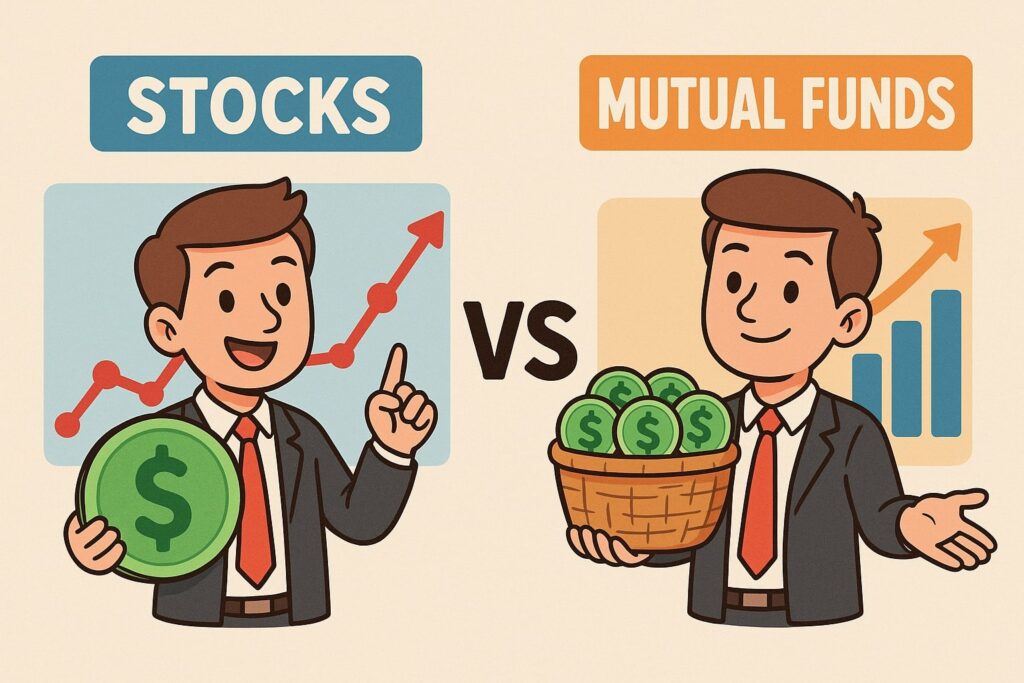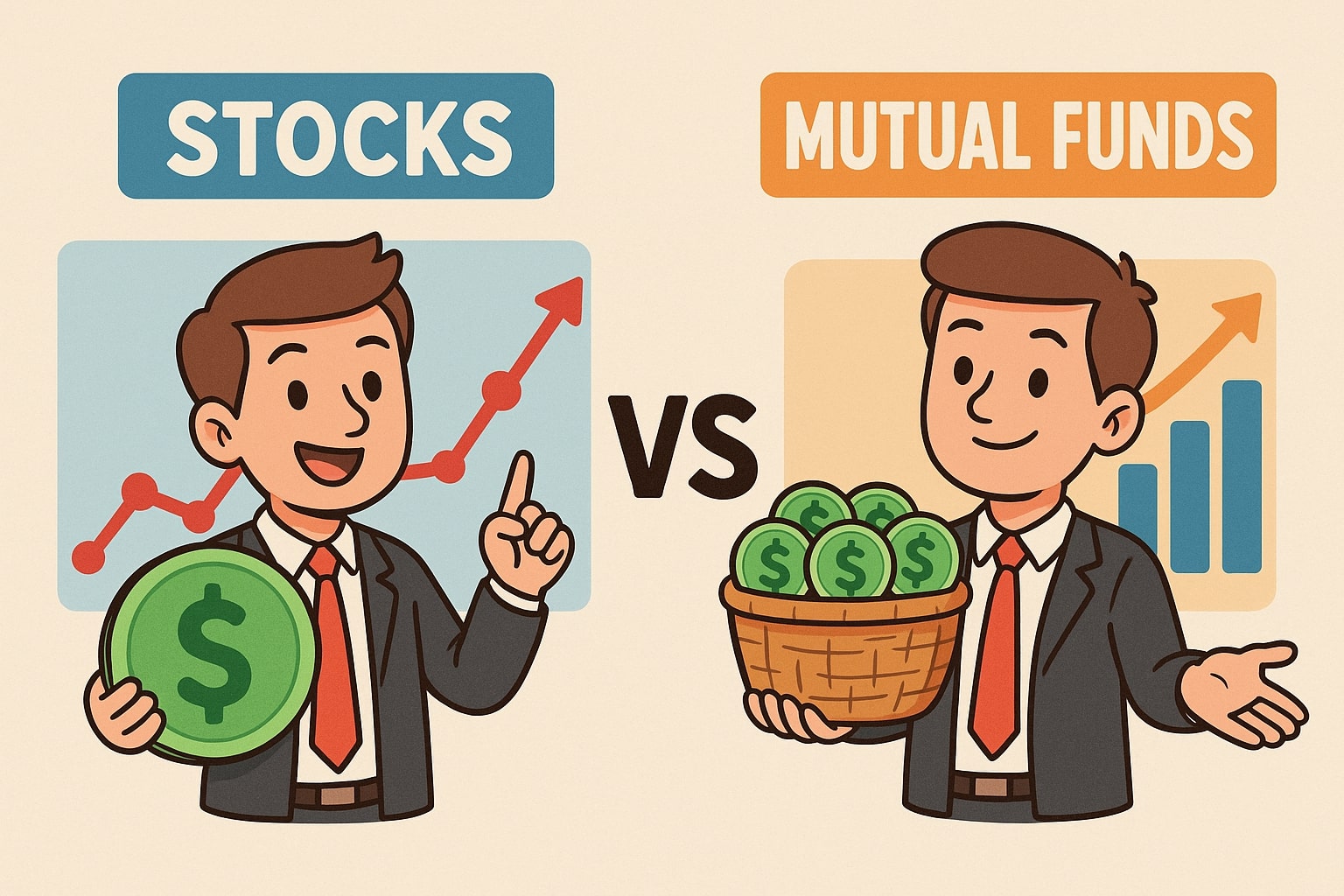
Not sure where to begin your investment process? Well, that is a common challenge faced by most first-time investors. Choosing between stocks and mutual funds is not always clear. Each has its advantages, disadvantages, and degree of participation.
Stocks grant individual control and possession, whereas Mutual funds deliver variety and expert oversight. Picking the right one is really a matter of how much risk you can expect, how hands-on you want to be, and what your long-term strategy is.
Don’t guess anymore. Take a closer look at how mutual funds vs stocks options function. Learning the basics helps you make the right decision and feel more confident as you invest for the first time.
About Stocks
Stocks, often called equities, signify a portion of interest in a corporation or enterprise. The purchase of a stock means acquiring a part or share in the firm, for which you have a claim over its assets and income. Two basic categories are common and preferred.
Stockholders of common stock have the right to vote and can receive dividends, whereas stockholders of preferred stock generally receive fixed dividends with minimal voting rights. Over time, equities have outperformed many other investments and, therefore, are integral parts of most investment portfolios.
Benefits of Investing in Stocks
Ownership and Voting Rights
Purchasing a company’s stock provides partial ownership to the investor, making them stakeholders. This feeling of ownership comes with the ability to vote on important company matters and access annual reports for enhanced knowledge of the business.
Diversification and Growth
Stock market investments diversify because their worth changes independently of bonds and property. Holding stocks for longer periods can minimise risks associated with other investments while creating opportunities for big and quick profits.
Dividend Income
Dividends are the extra annual income for the investor, irrespective of the stock’s performance. This income can be used to fund retirement or advance further investment.
High Return Potential
Stocks can provide greater returns within a shorter duration than other investments, such as Bank FDs. Profits increase in the long run, particularly with investments made in solid companies and diversified industries.
Liquidity and Flexibility
It is simple to liquidate stocks with high daily trading volumes on the NSE and the BSE. Investors can also begin with a minimal initial outlay by purchasing units of mid-cap or small-cap companies.
Protection and Ease
These investments are regulated by SEBI to safeguard investors and minimize fraud. Trading is simple and hassle-free, allowing quick access and smooth profit exchange.
About Mutual Funds
Mutual funds are a type of investment scheme. It consolidates money from a group of investors and invests it in different assets. Those assets include stocks, bonds, and money market instruments. This is done to diversify risk and achieve financial objectives with ease. Investors are given units allotted by the mutual funds. But do not directly own the underlying assets. In the stock market vs mutual funds comparison, mutual funds offer a convenient and accessible option through top mutual fund investment platforms.
Benefits of Investing in Mutual Funds
- Professional Management
Professional money managers run mutual funds full-time. They have the skills and resources required to actively sell, buy, invest, and keep investments under observation. They regularly review and rebalance the portfolio to ensure that it serves the purpose of the fund, freeing investors from individual research tasks.
- Risk Diversification
Mutual fund investment diversifies your money in different securities and asset classes such as equity, debt, and gold. This reduces risk as it ensures that if there is a fall in one investment, the others can compensate to maintain the overall worth of the portfolio.
- Affordability and Convenience
Mutual funds enable investors to begin with modest sums, which is simpler and cheaper than purchasing securities directly. This makes entry easy for the majority of investors without requiring them to have large amounts of money.
- Liquidity
Mutual fund units that are open-ended can be easily redeemed on any working day, giving instant access to your funds. Amounts of redemption are credited to your account usually within 1–3 working days, depending on the scheme.
- Low Cost and Regulation
Mutual funds offer low-cost ratios because of economies of scale and are regulated by SEBI, providing transparency, protection to investors, and fair valuation.
- Tax Benefits
Investment in ELSS mutual funds is eligible for tax relief under Section 80C, and long-term holding of mutual funds also provides tax efficiency.
Stocks vs Mutual Funds: A Tabular Breakdown
| Parameters | Stocks | Mutual Funds |
| Definition | Represent ownership of companies | Investors pool their money in mutual funds, which invest in securities on their behalf |
| Denomination | Different stocks can have the same or equal value | Pool of money collected from the investors |
| Numeric Value | Stock prices fluctuate based on market demand and supply | Have net asset values |
| Original Issuance | Original issuance is always possible | No such possibility |
| Risk Level | Higher risk level | Comparatively lower risk |
| Suitability | Best for expert investors with great market knowledge | Managed by professionals. Suitable for both new and experienced investors |
| Diversification | Possible only if stocks allow it | Offers more diversification opportunities |
| Return Potential | Relatively higher returns | Returns vary from high to moderate depending on the scheme |
| Market Knowledge | Investors must be well-versed in market forces | Market knowledge is rewarding but less critical than stocks |
| Trading Cost | Significantly higher trading costs | Mutual funds charge an annual expense ratio, which is deducted from the fund’s assets |
| Convenience | Investment requires a Demat and a Trading account. The process is complicated for beginners | Relatively more convenient. Can be initiated within minutes |
| Tax Benefits | Tax must be paid while selling stocks | Several schemes offer tax-saving benefits |
| Restrictions | Comes with asset-class restrictions | Money invested in diversified portfolios |
| Investment Horizon | Can be for short-term or long-term | Better results when invested for the long term |
| Systematic Plan | Stocks do not offer a built-in SIP option, though you can manually invest regularly | Includes a systematic investment plan feature |
| Control Over Investment | Stockholders have more control over investments | Investors have limited control over investments |
Investors need to choose between mutual funds vs stocks based on their knowledge, risk tolerance, and convenience needs. Both are unique in their advantages and can be profitable when chosen in line with abilities.
Also Read: How Mutual Funds Are Taxed | What is NSE and BSE? Difference Between NSE and BSE
Bottom Line
Stocks have greater returns and more power but involve higher risks and need to be invested with market knowledge. Mutual funds provide diversification, expert management, and simplicity in investment and are, therefore, ideal for new and expert investors. Always remember that choosing between the stock market vs mutual funds completely relies upon your risk-bearing capacity, objectives, and participation level. Knowing the differences enables you to make the right choice for your financial journey.
FAQs
1.Which SIP is superior?
Stock SIP gives higher returns but comes with greater risk. Mutual fund SIP provides diversification and expert management for stability.
2.Are mutual funds as risky as stocks?
As mutual funds distribute investments across various securities, it is considered less risky than investing directly in stocks.
3.Is it better to invest in a stock or a mutual fund?
Stocks provide higher returns with increased risk. Mutual funds give stability and diversification according to your goal and risk tolerance.
4.What are the main benefits of putting money into collective investment schemes?
Mutual Funds provide simple growth of wealth, expert management, tax advantage, and exposure to diversified investment tools.
5.How do mutual funds enable retail investors to take part in the country’s growth?
They offer a professionally managed vehicle for retail investors to invest and gain the benefits of India’s economic growth.
Reference
https://www.bajajfinserv.in/investments/mutual-funds-vs-shares
https://www.nirmalbang.com/knowledge-center/benefits-of-investing-in-stocks.html
https://www.bajajfinserv.in/investments/difference-between-mutual-funds-and-equities
Hello there, my name is Phulutu, and I am the Head Content Developer at Nivesh Karlo. I have 13 years of experience working in fintech companies. I have worked as a freelance writer. I love writing about personal finance, investments, mutual funds, and stocks. All the articles I write are based on thorough research and analysis. However, it is highly recommended to note that neither Nivesh Karlo nor I recommend any investment without proper research, and to read all the documents carefully.






Leave a Reply